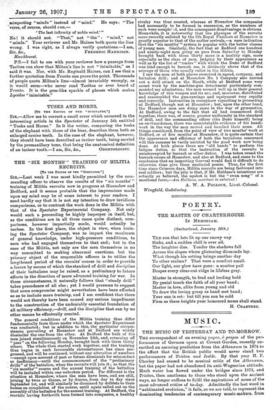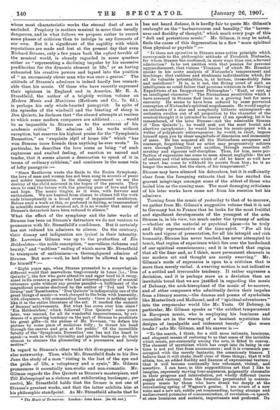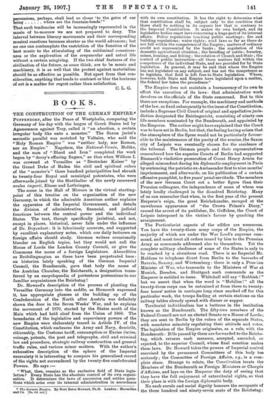MU SI C.
THE MUSIC OF YESTERDAY AND TO-MORROW. THE correspondent of an evening paper, a propos, of the per. formances of German opera at Covent Garden, recently un- earthed an amusing prediction from the Ath,enseum in 1874 to the effect that the British public would never stand two performances of Tristan and Isolde. By that year H. F. Chorley had ceased to be musical critic of the AfItcazunt, but the paper had not abandoned its anti-Wagnerian attitude. Much water has flowed under the bridges since 1874, and Tristan, then anathema to those who stood upon the ancient ways, no longer suffices to fulfil the aspirations of some of the most advanced critics of to-day. Admittedly the last word in "sublimated, eroticism," it fails, so we are told,,to represent the dominating tendencies of contemporary music-makers, from
whose most characteristic works the eternal duel of sex is excluded. Prophecy in matters musical is more than usually dangerous, and in what follows we propose rather to record some phases of criticism than to indulge in any forecasts of our own. But it is significant of the rapidity with which reputations are made and lost at the present day that even Richard Strauss, only a few years back the enfant terrible of the musical world, is already regarded in some quarters either as "representing a declining impulse by his excessive predilection for the dynamic element in life," or as having exhausted his creative powers and lapsed into the position of "an enormously clever man who was once a genius." The attitude of Strauss's admirers is indeed hardly less remark- able than his music. Of those who have recently expressed their opinions in England and in America, Mr. R. A. Streatfeild, the author of a brightly written volume on Modern Music and Musicians (Methuen and Co., 7s. 6d.), is perhaps his only whole-hearted panegyrist. In spite of the episodes of the windmill and the bleating of sheep in Don Quixote, he declares that "the absurd attempts at realism to which some modern composers are addicted would be as impossible to Strauss as to the austerest of his academic critics." He admires all his works without exception, but reserves his highest praise for the " Sympbonia Domestics," an "exquisite idyll of home life" which "has won Strauss more friends than anything he ever wrote." In particular, he describes the love scene as being "of such rapturous and exalted feeling, of emotion so sacred and tender, that it seems almost a desecration to speak of it in terms of ordinary criticism," and continues in the same vein of lofty panegyric
"Since Beethoven wrote the finale to the Eroica Symphony, the love of man and woman has not been sung in accents of purer and nobler inspiration. In the closing movement we see the destiny of the child mirrored in the hopes of the parents. They seem to read the future with the piercing gaze of love and faith and hope. The music tingles, as it were, with fervour and enthusiasm. We are hurried from climax to climax till the work ends triumphantly in a broad sweep of impassioned exultation. Before such a work as this, so profound in feeling, so transcendent in scientific mastery of musical art, it is no wonder that many of Strauss's detractors have been reduced to silence."
What the effect of the symphony and the later works of Strauss has been on Strauss's detractors we do not venture to pronounce with Mr. Streatfeild's confidence. But it certainly has not reduced his admirers to silence. On the contrary, their dismay and indignation are lyrical in their intensity. Mr. Lawreace Gilman was up to the production of Bin Heldenleben —the noble conception, "marvellous richness and beauty," and "sublime" ending of which move Mr. Streatfeild to transports of enthusiasm—a thoroughpaced admirer of Strauss. But now—well, he had better be allowed to speak
for himself
"Eight years ago, when Strauss presented to a somewhat in- different world that marvellous tragi-comedy in tones [i.e., 'Don Quixote], the few who gave attentive and eager heed to it recog- nised in its creatora genius who had achieved a quality of musical utterance quite without any precise parallel—a fulfilment of the magnificent promise disclosed by the author of Tod und Verk- Wong ' and • Zarathustra." Don Quixote' is indisputably one of the great things of music—a work charged to the brim with humanity, with eloquence, with commanding beauty, there is nothing quite like it in the entire literature of the art. It marked the summit of Strauss' achievements. But what has come over him since ? 'Bin Heldenleben; which followed Don Quixote' some years later, was marred, for all its wonderful impressiveness, by evi- dences of a growing tendency on the part of Strauss to prostitute his great gifts—in the phrase of Mr. Newman, to deface his picture by some piece of malicious folly ; to thrust his head through the canvas and grin at the public.' Of the incredible fatuity of the • Symphonia Domestica' one has not the heart to speak=a work in which triviality and ignoble burlesque do their utmost to obscure the glimmering of a persuasive and lovely motive."
In regard to Strauss's other works this divergence of view is also noteworthy. Thus, while Mr. Streatfeild finds in hisDon Juan the study of a man "rioting in the lust of the eye and the pride of life, a voluptuary and a cynic," Mr. Gilman pronounces it essentially non-erotic and non-romantic. Mr. Gilman regards the Don Quixote as Strauss's masterpiece, and Till Eulenspiegel as a riotous and exhilarating burlesque ; per contra, Mr. Streatfeild holds that the former is not one of Strauss's greatest works, and that the latter exhibits him at his philosophic standpoint. As Mr. Streatfeild admits that he • Tito Musk of To-morrolo London John Lane. Lea ed. net.]
has not heard Salome, it is hardly fair to quote Mr. Gilman's onslaught on the" barbarousness and banality," the "barren- ness and fiacidity of thought," which mark every page of this "dull and pretentious music." Mr. Gilman, it may be noted, finds the cause of this degeneration in a flaw "more spiritind than physical or psychic" :—
"Is there not operative in Strauss some active principle which corresponds to the philosophic attitude of Friedrich Nietzsche, for whom Strauss has confessed, in more ways than one, a fervent admiration? Is lie not smitten with that passion for personal aggrandisement, that vicious • Titanism ' of which Mr. Muncher speaks in his acute analysis of Nietzsche's temperament and teachings: that ruthless and strabismic individualism which, for all its valuable potentialities, is, at bottom, irremediably false and maleficent ? It is, is it not, the fitting creed of such an intelligence as could father that precious witticism in the 'Roving Expeditions of an Inopportune Philosopher' Kant, or cant, as an intelligent character' ! The Nietzscheaa proclivities which I have assumed in Strauss find issue in a growing lust for mere enormity He seems to have been seduced by some perverted conception of Nietzsche's spiritual megalomania. He would employ an orchestra of a size and complexity hitherto unimagined—an orchestra swollen out of all proportion to the character of the musical thought it is intended to convey (I am speaking, let it be remembered, of the later Strauss—not the admirable Strauss of Don Quixote '); he would seek out the most brutal and abortive cacophonies ; he would burden his music-paper with a welter of polyphonic extravagances he would, in short, impose himself upon you by sheer magnitude of dimensionand immensity of mass. He has acquired all the Nietzsehean arrogance and contempt, forgetting that no artist may progressively achieve save through humility and sacrifice, through ceaseless self- scrutiny and rigorous self-discipline. 'Thus, for him, mere per- fection of expression-has come to seem almost negligible : the art • of salient and vital utterance which of old he knew so well how to exert has come to withhold its secrets from him; he is no longer the master, but the slave, of his temperament."
Strauss may have silenced his detractors, but it is sufficiently clear from the foregoing extracts that he has excited the gravest misgivings amongst some of the ablest of those who hailed him as the coming man. The most damaging criticisms of his later works have come not from his enemies but his admirers.
Turning from the music of yesterday to that of to-morrow, we gather from Mr. Gilman's suggestive volume that it is not to Germany but to France that he looks for the most fruitful and significant developments of- the youngest of the arts. Strauss is, in his view, too mach under the tyranny of action —whether on the material or psychical plane—to be truly and fully representative of the time-spirit. "For all his truth and vigour of presentation, for all his intrepid and rich humanity. Strauss has never touched, has never attempted to touch, that region of experience which lies over the borderland of our spiritual consciousness ; and it is toward that region that all the finer and, as I think, more permanent elements in our modern art and thought are surely swerving." Mr.
Gilman's mode of expression is open to a criticism that is more than merely verbal. A swerving motion is not indicative of a settled and irrevocable tendency. It rather expresses a deviation, and it is perhaps more as a deviation than an inevitable trend that we are justified in regarding the music of Debussy, the arcb-hierophant of the music of to-morrow, and of other composers who admittedly derive their impulse from a literary source,—the dramas and poems of symbolists like Maeterlinck and Mallarme, and of "spiritual adventurers" into the crepuscular world like Mr. Yeats, Of Debussy, in- particular, Mr. Gilman speaks as "the subtlest temperament in European music, who is employing his luminous and
recondite art in the weaving of a hesitant mysticism into designs of impalpable and iridescent beauty." Quo mesa tend is 7 asks Mr. Gilman, and his answer is :—
" To the search, I think, for a still more intimate, luminous, and eloquent means of restoring to us that sense of the invisible which music, pre-eminently among the arts, is fitted to convey. The element of mysticism which has crept into its being in our time is not yet free from sensuousness ; and it is overmuch pre- occupied with the merely fantastic, the consciously bizarre. I believe that it will shake itself clear of these things ; that it will attain, too, an added fluidity and fineness of expressional texture; that it will become continually less vehement, violent, and assertive. I can hear, in this supposititious art that I like to imagine, supremely moving tone-sequences, poignantly chromatic in their progress and interrelation, yet wholly different (more supple and various) from the formulas perpetuated in contem- porary music by those who have drunk too deeply at the intoxicating spring of Wagner's genius. I am aware of a new voice and a new art, subtle yet commanding, having strange amid undiscovered potencies of communication, of revelation—a speech at once luminous and esoteric, importunate and profound. Its persuasions, perhaps, shall lead no closer 'to the gates of our being . . . . . . where are the fountain-heads.'" The' t such tendencies will be increasingly represented in the muaic of to-morrow we are not prepared to deny. The interval between literary movements and their corresponding musical reactions becomes shorter as the world advances; but no one can contemplate the restriction of the function of the best music to the stimulating of the subliminal conscious- ness or the exploration of the crepuscular and astral life without a certain misgiving. If the two chief features of the civilisation of the future, as some think, are to be music and machinery, it is as well that the protest against materialism should be as effective as possible. But apart from that con- sideration, anything that tends to contract or blur the horizons of art is a matter for regret rather than satisfaction.
C. L. G.
























































 Previous page
Previous page